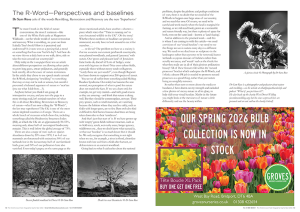Dr Sam Rose asks if the words Rewilding, Restoration and Recovery are the new ‘Superheros’

The more I work in the field of nature conservation, the more I ruminate—like one of the White Park cattle at Mapperton Wildlands—on the whole world of nature restoration and recovery. What is rewilding, six years on from Isabella Tree’s book? How is it perceived and understood? Is it now seen as a passing fad, a trend or something that has now ‘had it’s day’? And how do we view this on a daily basis as we walk, drive, ride or take the train around our countryside?
Only today in the i newspaper there was an article about different perspectives on allowing urban parks to grow long grass, attract pollinators, and generally look scruffy, all in the cause of nature restoration. In the article they chose to use speech marks around the R-Word, denigrating “rewilding” to something that may or may not be real or serious, but overall it presented a balanced argument of nature vs ‘neat’ure (you see what I did there…?).
Anyhow, before you think I am going all introspective on you, and you turn the page to a more riveting read, let’s remind ourselves of what this is all about; Rewilding, Restoration or Recovery of nature—what I am now calling the “R-Words”, the last true superheroes! The UK is one of the most nature depleted countries in Europe. There are a whole bunch of measures which show this, including something called the Biodiversity Intactness Index (BII), in which the UK sits at approximately 50–53%, meaning only about half of our original biodiversity remains. This is well below the global average of 75%.
There are also a range of stats such as: species abundance down by 20% since 1970; 1 in 4 of our mammals are threatened with extinction; 90% of our wetlands lost in the last century; half of our farmland birds gone; and 30% of our pollinators have also vanished. Even today’s paper, on the same page as the above mentioned article, have another—shorter—piece which states that “’Time is running out’ to save threatened wildlife in the UK”. Oh the irony! Whether these numbers or headlines are precise is immaterial, we only have to look around to see it for ourselves….
… or do we? The problem we have as a society is that we associate our current patchwork countryside, neat planted woodlands, and general ‘greenery’ with nature. Our ‘green and pleasant land’ of Jerusalem fame looks ok, doesn’t it? Lots of hedges, some even with big trees in them? Nice even-colour fields, especially those without messy scrub or Ragwort, “surely those are just weeds?”, even though Ragwort has been shown to support over 200 species of insect.
You see we all suffer from something called Shifting Baseline Syndrome. Our reality has become the new normal, our perception of what is good for nature does not match the facts. If we see a barn owl, for example, we get very excited—and with good reason as they are amazing—and think that nature is doing well. But they should be commonplace, not rare. Their prey species, such as small mammals, are vanishing because the habitats where they can live safely, such as fields with longer grass, are so few. Barn owls also find it difficult to find homes because dead trees are being taken down due to their ‘untidiness’.
And that’s just that start of it. If we have grown up with ‘empty’ green fields without structure, such as in-field trees, scrub, wet rushy areas, longer grasses, wildflowers etc., then we don’t know what natural is, or that our ‘baseline’ is so much lower that it should be. We only recognise that something is not right when we see, for example, a river in flood, chocolate brown with lost soil from a field after harvest, or deforestation in an ancient woodland.
Going back to what I said earlier about the national problems, despite the plethora and perhaps confusion of stats, there is no doubt that we need all of the R-Words to happen over large areas of our country, and we need that now. Of course, we need to be careful and work mainly where the land is marginal for farming, as we still need food, grown in a sustainable and nature friendly way, but there is plenty of space for both, even on the same land—known as ‘land sharing’.
And in addition to the practical work—and this is where I am coming to with this article—we need a revision of our ‘visual baseline’—we need to see the things we see in nature every day in a different way. We need to see dead trees as sculptures in the landscapes rather than eyesores to be removed, beaver wetlands as joyous mosaics of habitats rather than scruffy wet areas, and ‘weeds’ such as the thistle for what they really are in all of their glorious pollination beauty! All of these features fall within the ‘natural processes’ bracket which underpins the R-Words, and I think a decent PR job is needed to promote natural processes as a good thing, rather than just nature being an unsightly nuisance.
So rather than rant on more about the media or baselines, I have drawn on my strength and included a few photos of messy nature in all its glory, to help shift your visual baseline. Maybe in the future you might look at the messiness of nature a little differently and see the beauty within.
Dr Sam Rose is a photographer and podcaster about nature and rewilding—see his website at whatifyoujustleaveit.info and podcast “What if you just leave it?”.
He also heads up the charity West Dorset Wilding (westdorsetwilding.org) but the views expressed here are personal and are not said on the charity’s behalf.



